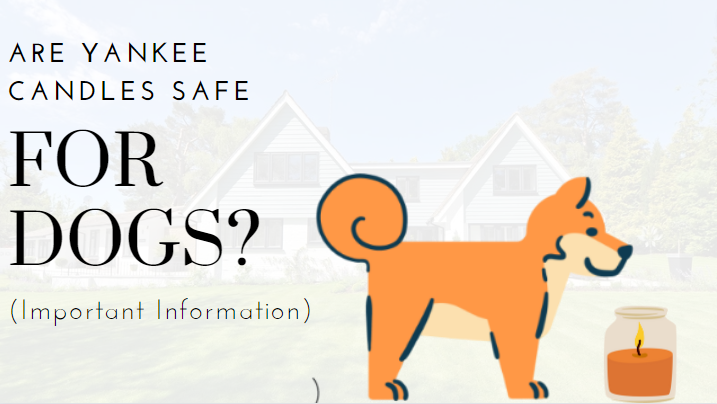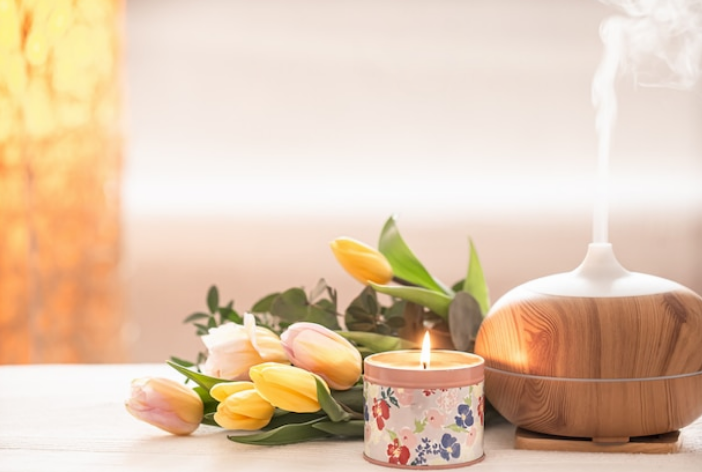Dogs are often curious creatures, just like humans. It is not uncommon for them to get into things around the house, especially if they smell something interesting. One popular item that can attract a dog’s attention is a Yankee Candle. In this article find out what dangers there are of dogs interacting with Yankee Candles and what you should do if your dog does get too close.
As a dog owner who loves making my home smell nice, I’ve often wondered if my Yankee candles could be harmful to my furry friend. If you’re asking the same question, you’ve come to the right place! Let’s dive into everything you need to know about Yankee candles and your dog’s safety.
The Quick Answer
Most Yankee candles that use soy wax instead of paraffin wax are generally safe for dogs when used properly However, certain scents like citrus, peppers, vinegar, or mothballs can irritate dogs, and any candle poses risks if your pup gets too close or ingests it
Understanding Candle Dangers for Dogs
Before we focus specifically on Yankee candles it’s important to understand the potential hazards that any candle can pose to our four-legged friends
- Open flames – Dogs might accidentally knock over candles or burn themselves by getting too curious
- Hot wax – Can burn paws or noses if touched while hot
- Soot and smoke – Can irritate your dog’s lungs and worsen respiratory conditions
- Fragrance oils – Some scents contain essential oils that might be toxic to dogs
- Ingestion risks – If your dog somehow eats candle wax, it could cause digestive issues or blockages
Yankee Candle Ingredients: Are They Safe?
Yankee candles use several ingredients that pet owners should be aware of:
Wax Type
Yankee uses different types of wax in their candles:
- Premium-grade paraffin wax – Used in many Yankee candles. While they use refined paraffin which many consider non-toxic, it’s still not ideal for dogs if ingested.
- Soy wax blends – These are generally considered safer as they produce less soot and toxic compounds when burned.
Fragrance Oils
Yankee candles are famous for their strong scents, which come from a blend of:
- Synthetic fragrance oils
- Natural essential oils (depending on the scent)
Some specific Yankee candle fragrances may contain essential oils that are potentially harmful to dogs, even in small amounts.
Popular Yankee Candles: Dog Safety Guide
Here’s a quick look at some popular Yankee candles and their safety for dogs
| Candle | Aroma | Wax Used | Safe for Dogs? |
|---|---|---|---|
| White Spruce & Grapefruit | Citrus | Premium Soy-Wax blend | Yes, but dogs dislike citrus odors |
| Balsam & Cedar | Woody | Premium-grade Paraffin wax | No, avoid direct contact |
| Lavender Vanilla | Floral | Soy wax blend | No, avoid direct contact |
| Lilac Blossoms | Floral | Soy wax blend | Yes, but prevent direct contact |
Signs Your Dog Might Be Sensitive to Candles
How do you know if your candle is bothering your dog? Watch for these symptoms:
- Swelling on the earflaps, face, and lips
- Excessive itchiness
- Sneezing
- Inflamed or red skin
- Itchy ears
- Vomiting
- Diarrhea
If your dog shows any of these signs after you’ve been burning candles, consult your vet and stop using the candles immediately.
Tips for Using Yankee Candles Safely Around Dogs
I’ve found these safety tips helpful for using candles in my dog-friendly home:
1. Choose Dog-Friendly Scents
Not all candle scents are created equal when it comes to your dog’s nose! Some fragrances dogs tend to tolerate better include:
- Vanilla
- Chamomile
Avoid scents with:
- Citrus (lemon, orange, grapefruit)
- Tea tree
- Strong floral scents
- Peppers
- Vinegar
- Mothballs
2. Burn in Well-Ventilated Areas
Always light your Yankee candles in rooms with good air circulation. This helps disperse any potential irritants and keeps the air fresher for both you and your dog.
3. Keep Candles Out of Reach
This is so important! Place your candles on high shelves or surfaces where your dog can’t accidentally knock them over or get too close to the flame.
4. Never Leave Burning Candles Unattended
This is a good rule even if you don’t have pets, but it’s especially crucial with dogs around. Always extinguish candles when you leave the room.
5. Monitor Your Dog
Keep an eye on how your dog behaves when you’re burning candles. If they seem uncomfortable, start sneezing, or try to avoid the room, that’s a sign to blow out the candle.
6. Consider Alternatives
If you’re worried about candle safety, there are pet-friendly alternatives that can make your home smell nice:
- Pet-safe diffusers
- Simmer pots with dog-friendly ingredients
- Unscented candles (reduce the chemical exposure)
- Flameless LED candles (eliminate fire risk)
Common Questions About Yankee Candles and Dogs
Are Yankee Candles Toxic for Humans?
Yankee Candles claims not to use lead wicks, which is good. However, they do use refined paraffin wax in many products, combined with artificial fragrance. This means they can’t be considered completely non-toxic for humans either, though most people don’t experience problems when used properly.
Are Candles Made Out Of Coconut Wax Safe For Dogs?
Coconut wax candles are generally a better alternative to paraffin candles for homes with pets. They burn cleaner and don’t release as many toxic fumes. However, they’re more expensive than paraffin candles.
What About Woodwick Candles?
Like many candles, Woodwick candles contain paraffin wax, which isn’t ideal for dogs as it can release toxins when burned. Additionally, if your dog somehow eats the wax, it could cause health issues including vomiting.
Are Voluspa Candles Safe for Dogs?
Voluspa candles are among the first commercial candles based on coconut wax, which makes them a safer option around pets since they don’t release as many toxic fumes. However, the usual precautions about keeping flames away from dogs still apply.
Are White Barn Candles Safe for Dogs?
Bath and Body Works White Barn candles contain soy wax, which doesn’t release as many harmful toxins when burned. These are generally safer for dogs, but you should still keep them out of reach.
Are Yankee Candle Plug-Ins Toxic?
Since manufacturers don’t always disclose all ingredients in their products, it’s hard to determine the exact toxicity level. It’s best to use these products according to package instructions and monitor your dog for any adverse reactions.
Are Wax Melts Safe For Dogs?
Wax melts typically contain essential oils or chemicals in lower quantities than candles. While they eliminate the fire hazard, ingestion can still cause health issues for your dog. Keep them away from curious pups!
My Personal Experience
I’ve found that my dog gets a bit sneezy when I burn certain Yankee candles, especially those with citrus scents. I’ve switched to using unscented or vanilla candles in rooms where he spends time, and I always make sure to have a window cracked open for ventilation.
Last month, I accidentally left a Balsam & Cedar candle burning when I went to get the mail. When I came back, I found my pup sneezing like crazy! I immediately blew out the candle and opened some windows. Since then, I’ve been much more careful about when and where I burn my candles.
Final Thoughts: Finding Balance
It is possible to enjoy Yankee candles while keeping your furry friend safe. By choosing dog-friendly scents, practicing safe burning habits, and monitoring your pet’s reactions, you can create a pleasant-smelling home that’s still safe for your four-legged family member.
Remember, every dog is different – some might be more sensitive than others. When in doubt, consult with your veterinarian about any specific concerns related to your dog’s health and exposure to candle fragrances.
Do you have any experiences with Yankee candles and your dogs? I’d love to hear about them in the comments!

Do Yankee Candles Contain Essential Oils?
We all know Yankee Candles make our homes smell great, but have you ever wondered if they contain essential oils? It turns out, they do! Each candle is made with a blend of natural and essential oils that are carefully chosen to create the perfect fragrance.
So, not only do Yankee Candles make your home smell amazing, but they also contain some natural benefits!
Info on Yankee Candles
Since they are not currently compelled by law to do so, Yankee Candle Company does not list all of the ingredients in its candles. The business does provide some fundamental details regarding its candles, some of which can help some customers feel more at ease.
- Lead wicks are not used by them.
- They all use wicks that are safe because they are all made of pure cotton.
- Their candles are scented using aroma extracts and actual essential oils.
- It was confirmed by a direct phone call to the business that Yankee uses refined paraffin wax in their candles.

